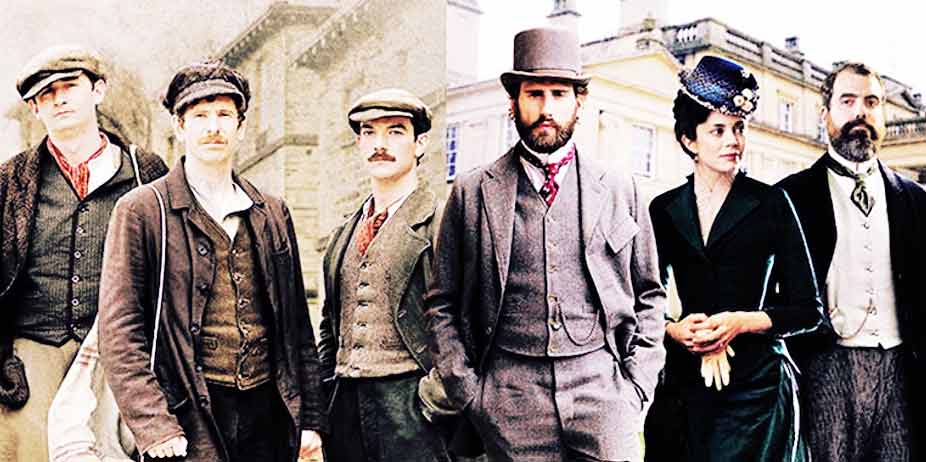
The English Game (2020)
Based on a true story, Julian Fellowes brings us a working class tale of men pitted against the establishment for the right to play professional football (soccer) in the United Kingdom.
Hard-working Fergus Suter (Kevin Guthrie) has a particular talent for the sport, and a willingness to play for whomever is most eager to foot his bill. Desperate to pay his family’s way out of difficult circumstances, he turns up for one match eager to prove himself, alongside his surrogate brother, Jimmy Love (James Harkness). But they soon find out the “toffs” don’t always play by the rules. The wealthy Arthur Kinnaird (Edward Holcraft) sees no reason to keep playing the game after a setback and postpones it a week, knowing they must default since they cannot afford to travel out of their own county twice. He also has problems at home, since his father (Anthony Andrews) thinks football is a “game for little boys.”
When his wife Margaret (Charlotte Hope) miscarries their child, their lives change. She seeks an outlet for her desire to be useful and becomes involved with a local orphanage, never realizing the terrible secrets she may uncover in the process. In the meantime, Arthur’s desired flame, Martha (Niamn Walsh), is trying to keep the secret of her illegitimate daughter’s parentage, but struggles to retain her job. And tensions rise between the rich, who want to keep working-class men out of a “gentleman’s sport,” and the poor who just want to play.
I have enjoyed Fellowes’ writing on and off over the years, but this series did nothing for me. I’m not sure if it was just bland or the subject of no interest to me. Perhaps in trying to keep to a set of historical events, he found himself somewhat stifled, but it never quite held my interest enough to make me marathon it. The characters are somewhat typical, although Margaret happens to be the most sympathetic and interesting. Even if the struggle between classes is true, there’s no real new angle on it, just a lot of classism. And the characters are all rather thin. I never understood why Lord Kinnaird thought his son such a “wastrel,” considering he was a decent businessman with a happy marriage. Just because he likes to play “football”? The first and last episodes center around the game, with a lot of character-driven drama in-between. The actors are excellent, though some fit the period better than others, and the costumes are lovely. It has the romanticism and grit one expects from a Victorian drama. It’s mostly clean, as one expects from Fellowes, but it left me wanting more.
Sexual Content
An unmarried man and woman sleep together (off-screen);
this woman has an illegitimate child from an affair with
a married man. Dialogue exposes and references this.
Some mild flirtations and innuendo.
Language:
About a dozen abuses of Christ's name, some general
profanities, uses of bloody, etc.
Violence:
Soccer games turn into brawls where people are punched,
kicked, and knocked to the ground; a man is slammed so
hard in the game, his leg snaps and we see the bloody
injury with the raw bone exposed. Elsewhere, there are
fisticuffs and bullying in the streets, on the field,
and off the field. A woman grabs another woman who tries
to walk out of a 'baby market' without paying and
threatens to hurt her.
Other:
Stereotypical attitudes about rich vs. poor and social
class warfare.
